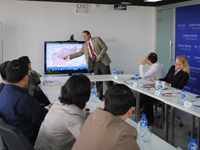Registration
Thank you!
You will receive an email confirming your registration.
IMGXYZ3085IMGZYXAs NATO members approach their respective deadlines for withdrawal from Afghanistan, conditions on the ground and China’s role in the region merit greater attention and analysis. In the seventh installment of the “China and South Asia Dialogues” series, Carnegie’s Gilles Dorronsoro discussed his observations from a recent month in Afghanistan with a panel of Chinese experts at the Carnegie-Tsinghua Center for Global Policy. Carnegie’s Paul Haenle gave the introduction and Carnegie’s Lora Saalman moderated the event.
Negotiation versus Reintegration
- Strategic Miscalculation: Dorronsoro argued that the current U.S. strategy of counter-insurgency and transition has been unsuccessful. The U.S. approach has focused on the reintegration of insurgents, but Dorronsoro stated that reintegration is perceived as tantamount to surrender. He argued that by seeking reintegration instead of negotiation, a number of groups within Afghanistan are being left disenfranchised, which is unlikely to lead to long-term stability.
- Brief Window for Negotiation: Dorronsoro noted that as the United States enters its next election cycle, the Obama administration will be unable to engage in negotiations with the Taliban. As a result, the next six months will serve as a brief window during which negotiations could occur.
U.S. and NATO Withdrawal
- U.S. Ambiguity: U.S. ambiguity on its long-term plans in Afghanistan, combined with often contradictory statements about its plans for U.S. bases in the region, have elicited broader questions over U.S. intentions, argued Dorronsoro.
- Potential Power Vacuum: One of the Chinese participants expressed concern that the U.S. withdrawal might create a power vacuum akin to the Soviet withdrawal from Afghanistan in the 1980s, and questioned what mechanism or group could fill this void.
- Afghan Forces: Dorronsoro noted that, despite the significant U.S. investments and efforts, Afghan forces are still deficient in both numbers and level of training. Moreover, due to their diverse ethnic composition, their legitimacy is questioned by the largely Pashtun population of Afghanistan. These factors, along with the geographic limitation of NATO successes to southern Afghanistan, convince Dorronsoro that upon NATO’s departure, the Taliban and other such groups will resume control.
China’s Soft Influence and Pakistan
- Pakistan: Dorronsoro expressed concern over Pakistani support for insurgent and terrorist groups within Afghanistan and argued its involvement in the northeastern region of Afghanistan near Kabul poses a strategic threat. He noted that Afghanistan has in many respects become the battleground for a proxy war in which NATO forces are pitted against Pakistan. Nonetheless, Dorronsoro emphasized that Pakistan is crucial to long-term stability, so any decisions made about Afghanistan’s future will require Pakistan’s acceptance.
- China: One of the Chinese participants suggested that China’s most likely involvement in Afghanistan would be economic, which means its chief engagement requires an end to the conflict. Dorronsoro suggested that this approach is shortsighted and encouraged China to assume a role that is more commensurate with its greater interest in regional stability and growth. In this regard, he suggested China could exert “soft influence” on defining national interests for the regional and international players involved and that China, as a strategic partner of Pakistan, could have a positive impact on Pakistan’s stance and involvement in negotiations.
Taliban and Political Legitimacy
- Taliban Participation: In response to a question by one of the Chinese participants about the role the Taliban could play in Afghanistan’s political future, Dorronsoro said that, given political realities and the need for a coalition government to mediate among the various interest groups, any Afghan coalition government would have to include the Taliban. The U.S. tactic of decimating the Taliban under a tactic he described as trying to “kill its way out of Afghanistan” is unlikely to work. The greater threat to U.S. interests comes from the use of Afghanistan as a base by al-Qaeda, in Dorronsoro’s view.
- Changing Taliban Policies: Dorronsoro commented that the Taliban has developed more liberal policies on facial hair for men, education for girls, etc. following the invasion. However, a Chinese participant questioned whether the Taliban might return to its hard-line policies if it were to once again be part of the governing body in Afghanistan.
- Taliban Approval: A U.S. participant questioned the approval rating for the Taliban, estimating it to be less than 8 percent. Dorronsoro replied that these numbers did not reflect his own experiences on the ground. The Taliban continues to exert a much greater influence than is acknowledged by the United States. He argued that the Taliban must be incorporated into the new government and that the Karzai administration is too weak to continue to govern the country.
Characterizing Cohesion and Instability
- Military versus Economic: One of the Chinese panelists commented that China’s perception of Afghanistan is focused 20 percent on military issues and 80 percent on political and economic realities.
- Nationalism: Another Chinese participant noted that the current situation in Afghanistan reminds him of China’s civil war from 1945-1949. He concluded that the war in Afghanistan is not about terrorism, but about nationalism. Dorronsoro replied that the insurgency in Afghanistan is different from the one China faced during that era.
- The New Taliban: While the various groups in Afghanistan were not closely coordinated in the 1980s, they are much more coordinated now, Dorronsoro said. The U.S. tendency to support certain groups over other ones has led to resentment that, combined with the increasingly lenient policies of the Taliban and its focus on building schools and putting people back to work, has led to a domestic hardening against the United States and increased support of the Taliban.
Discussants: Ma Jiali, Han Hua, Chen Qi, Yang Xiaoping, Xu Jin, Long Xingchun, Hong Yuan
